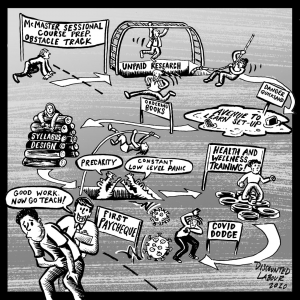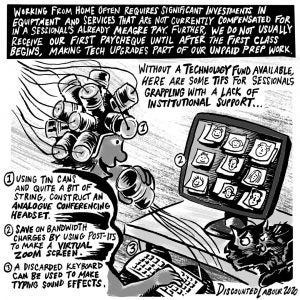Respect, Equity, and Inclusion
McMaster’s Statement on Building an Inclusive Community with a Shared Purpose states that “inclusion occurs when an organization provides equitable access to its services, benefits and opportunities, when systems and structures facilitate full participation by all members and where members are treated equitably and fairly and are recognized for their contributions.” Sadly, one of the most consistent and disturbing findings in our survey feedback was a lack of respect for Sessional Faculty at McMaster. These experiences are caused by a lack of support in day-to-day teaching, exclusion from Departmental activities and decisions, a lack of recognition for contributing to the success of the university, unfair hiring processes, and even online bullying from students. The Bargaining Team would like to incorporate language into the agreement that would acknowledge the service and contributions of our members to the University, and to demonstrate inclusiveness by foreclosing situations and circumstances that allow for bullying, harassment, nepotism, and discrimination in all of its forms.
Compensation
As always, remuneration is a vital part of the bargaining process. McMaster is proud of its ranking as one of Canada’s top schools and a top-150 university in the world. We know that Sessionals play a vital role in this and deserve much higher remuneration. Some members have contributed decades of their lives to this institution, with little to show on a bi-weekly basis and nothing to show for retirement. Compensation can take a variety of forms, including wages and pensions. We will be seeking increases that reflect McMaster’s high global and national ranking and demand that we be compensated in line with Sessionals at other universities.
Job Security
Our membership is diverse, and consists of people who work both in industry and teach, younger Sessionals(often graduate students) who are new to teaching, and long-term Sessionals whose income is dependent upon sessional work. While all Sessionals deserve job security (and our provisions will reflect this), the latter group of long-term Sessionals in particular require improved job security as their access to secure work is precarious even though the employer clearly requires their services on an ongoing basis. Also, some members have shown decades of commitment to McMaster and contribute to the University’s reputation of teaching excellence. All members deserve to be able to plan to retire in dignity. We’re asking McMaster to help members live and retire with some basic security. Your Union will propose language to make access to work more predictable, steady, and known in advance in an effort to mitigate against the precarious nature of sessional work.
“Job security means, to me, that I don’t have to re-apply for my job every four months. More importantly, it means I have some certainty in knowing that I will have a job to return to each year. It means not having to guess if there will be courses to teach and if the departments I’ve worked in will hire me back or not.”
-Dr. Tim Fowler, Faculty of Social Sciences and DeGroote School of Business
Health and Wellbeing
While the Union has bargained a number of benefits for Unit 2 Members over the years (including a Health Care Spending Account (HCSA) and a Dental Plan), there are definite shortfalls in this funding. These shortfalls have become even more evident in the last year of online teaching during the pandemic, as many members made clear by identifying basic medical coverage and mental health supports as key priorities in our survey. Unit 2 members deserve more comprehensive, stable, and affordable health and dental benefits, which we hope to expand. The Bargaining Team is seeking more support from the Employer to sustain current health and dental benefits and explore new benefits for members’ peace of mind and day-to-day wellbeing.
Workload
Members have identified workload as a significant concern on our bargaining survey and in daily conversation. In some cases, the number of students per course has tripled with the move to online teaching, with no additional supports provided. We need to make sure that there are no surprises when it comes to class size, and that members are better supported when faced with more students. Studies show that smaller classes are also better for students. The extra work that BIPOC (Black, Indigenous, and People of Colour) members and members from other equity-seeking groups perform to make students feel included and to increase diversity in departments should be recognized. We need to make sure that all of those “extras” you do as front-line instructors are compensated. Institutions that are comparable to McMaster in size and prestige offer more supports for contract faculty’s workloads than McMaster, so we are asking the Employer to step up and recognize your workload and some of the “extras” that now seem to be part of the job.
Professional Supports and Paid Training
As we prepare to enter a second year of COVID precautions, online teaching will once again be a feature of many of our members’ lives. Even before the pandemic, members have consistently identified a lack of professional supports over the past few years. Professional supports include access to professional development and resources such as technology and access to paid training (including anti-oppression and diversity training) that is to the high pedagogical standards one expects of McMaster University. The Bargaining Team is exploring language to secure and improve professional supports for our members–the people who contribute so much to McMaster’s reputation for teaching excellence.






